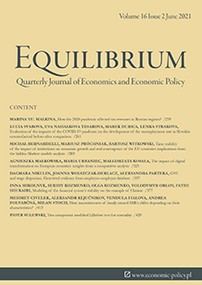The impact of digital transformation on European countries: insights from a comparative analysis
The impact of digital transformation on European countries: insights from a comparative analysis
Author(s): Agnieszka Małkowska, Maria Urbaniec, Malgorzata KosalaSubject(s): Business Economy / Management, Economic development, EU-Approach / EU-Accession / EU-Development, ICT Information and Communications Technologies
Published by: Instytut Badań Gospodarczych
Keywords: digital transformation; technological development; economy 4.0; society 4.0; company 4.0; European countries;
Summary/Abstract: Research background: In the era of the digital revolution, the Internet, automation and robotisation, new industrial relations and dynamic interactions among different stakeholders are giving rise to new opportunities and challenges. The changes associated with the enforcement of the “Industry 4.0” concept require adaptation to these developments at different levels of the economy and society in order to support digital transformation. Purpose of the article: The aim of this paper is to measure and assess the impact of digital transformation on European countries (EU). The comparative analysis of technological development in EU countries includes three dimensions: the digitalisation of society (Society 4.0), the ability of the economy to face the challenges of technological development (Economy 4.0), as well as the exploitation of ICT in companies (Companies 4.0). Methods: The empirical section of the article was built on a two-stage analytical approach: (a) cluster analysis methods to assess differences and similarities between EU countries (Hierarchical Cluster and K-Means Cluster) and (b) the multi-criteria decision-making method (TOPSIS) to rank countries according to the adopted evaluation criteria. For the purposes of this analysis, data from the Eurostat database have been applied. Findings & value added: The results of this analysis demonstrate the impact of technological transformation on the economy and society in EU countries grouped according to a similar level of development, such as countries with high, medium and low performance. This has contributed to indicating the cohesion in technological development achieved by each country group and to recognising the digitalisation gap between EU Member States. The novelty of this study consists in applying the multi-stage, multi-criteria analysis based on cluster analysis and the TOPSIS method, as well as the comparative analysis of the impact of technological developments on the societies and economies of EU countries. This paper extends similar studies by focusing on the application of a broad range of indicators regarding a holistic perspective including three dimensions: societies, economies and companies. The results provide valuable insights into evaluating the technological progress in European countries.
Journal: Equilibrium. Quarterly Journal of Economics and Economic Policy
- Issue Year: 16/2021
- Issue No: 2
- Page Range: 325-355
- Page Count: 31
- Language: English

